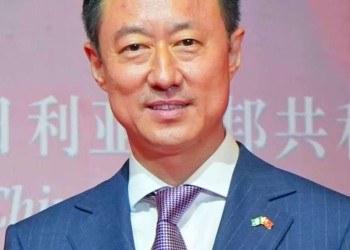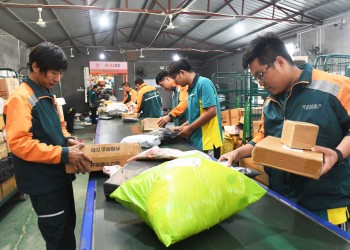Chinese President Xi Jinping and U.S. President Joe Biden on Wednesday had a candid and in-depth exchange of views on strategic and overarching issues critical to the direction of China-U.S. relations and on major issues affecting world peace and development.
The meeting was held at Filoli Estate, a country house approximately 40 km south of San Francisco, California. Biden warmly received Xi when he arrived at Filoli Estate.
Noting that the world today is undergoing profound changes unseen in a century, Xi said there are two options for China and the United States — one is to enhance solidarity and cooperation, join hands to meet global challenges and promote global security and prosperity; and the other is to cling to the zero-sum mentality, provoke rivalry and confrontation, and drive the world toward turmoil and division.
The two choices point to two different directions that will decide the future of humanity and Planet Earth, he said, adding that the China-U.S. relationship, which is the world’s most important bilateral relationship, should be perceived and envisioned in this broad context.
For China and the United States, turning their back on each other is not an option, Xi noted, stressing it is unrealistic for one side to remodel the other, and conflict and confrontation has unbearable consequences for both sides.
Major-country competition cannot solve the problems facing China and the United States or the world, he continued, noting that the world is big enough to accommodate both countries, and one country’s success is an opportunity for the other.
Xi elaborated on the essential features of Chinese modernization and its significance, China’s development prospects, and its strategic intention, pointing out that China’s development is driven by its inherent logic and dynamics.
Noting China is promoting the great rejuvenation of the Chinese nation on all fronts through Chinese modernization, Xi stressed that the country will not take the old path of colonization and plundering, or the wrong path of seeking hegemony with growing strength, saying it does not export its ideology, nor have a plan to surpass or unseat the United States. Likewise, the United States should not scheme to suppress and contain China, he added.
The Chinese president pointed out that mutual respect, peaceful coexistence and win-win cooperation are the lessons learned from 50 years of China-U.S. relations and the conflicts between major countries in history, which should be the direction of joint efforts between the two countries.
In San Francisco, China and the United States should assume a new vision and build together five pillars for China-U.S. relations, he noted, pointing out the two countries should jointly develop a right perception.
China is consistently committed to having a stable, healthy and sustainable relationship with the United States, and China has interests that must be safeguarded, principles that must be upheld, and red lines that must not be crossed, Xi said, expressing hope that the two countries could be partners that respect each other and coexist in peace.
China and the United States should manage disagreements effectively, Xi said. Disagreements should not be a chasm that keeps the two countries apart, he stressed, adding that instead, the two sides should look for ways to build bridges to help them walk toward each other.
It is important that they appreciate each other’s principles and red lines, and refrain from flip-flopping, being provocative, and crossing the lines, said the Chinese president.
They should have more communication, more dialogues and more consultations, and calmly handle their differences as well as accidents, Xi added.
China and the United States should jointly advance mutually beneficial cooperation, Xi said. The two countries have broad common interests in a wide range of areas, including traditional areas such as the economy, trade and agriculture, as well as emerging areas such as climate change and artificial intelligence (AI), he said.
Under the current circumstances, the common interests of the two countries have not decreased, but increased, Xi said.
It is important to fully utilize the restored and new mechanisms in foreign policy, economy, finance, commerce, agriculture and other fields, and carry out cooperation in such areas as counternarcotics, judicial and law enforcement affairs, AI, and science and technology, he added.
Xi also called on China and the United States to jointly shoulder responsibilities as major countries. The problems facing human society cannot be solved without cooperation between major countries, Xi said.
China and the United States should lead by example, step up coordination and cooperation on international and regional issues, and provide more public goods for the world, he said.
The two sides should keep their initiatives open to each other, or coordinate and connect them for synergy, to benefit the world, Xi added.
Meanwhile, the Chinese president urged China and the United States to jointly promote people-to-people exchanges. The two sides should increase flights, advance tourism cooperation, expand subnational exchanges, strengthen educational cooperation and cooperation on affairs related to the disabled, reduce negative factors that hinder people-to-people exchanges, and encourage and support greater interactions and communication between their people, so as to consolidate the foundation for the healthy development of China-U.S. relations, Xi said.
Xi also elaborated on China’s principled position on the Taiwan question. He pointed out that the Taiwan question remains the most important and most sensitive issue in China-U.S. relations. China takes seriously the positive statements made by the United States in the Bali meeting, he said, adding that the U.S. side should take real actions to honor its commitment of not supporting “Taiwan independence,” stop arming Taiwan, and support China’s peaceful reunification. China will realize reunification, and this is unstoppable, Xi stressed.
Xi pointed out that U.S. actions against China regarding export control, investment screening and unilateral sanctions seriously undermine China’s legitimate interests. Noting that China’s development is driven by innovation, he held that stifling China’s technological progress is nothing but a move to contain China’s high-quality development and deprive the Chinese people of their right to development.
China’s development and growth, driven by its own inherent logic, will not be stopped by external forces, Xi continued, saying that he hoped the U.S. side to take China’s concerns seriously and adopt tangible steps to lift its unilateral sanctions, so as to provide an equal, fair and nondiscriminatory environment for Chinese businesses.
Noting that U.S.-China relationship is the most important bilateral relationship in the world, Biden said that a U.S.-China conflict is not inevitable, adding a stable and developing China serves the interests of the United States and the world, and China’s economic growth is beneficial to both the United States and the world.
Reaffirming the five commitments he made at the Bali summit, Biden said that the United States does not seek a new Cold War, it does not seek to change China’s system, it does not seek to revitalize alliances against China, it does not support “Taiwan independence,” and that it has no intention to have a conflict with China.
The United States and China are economically interdependent, he said, adding that the United States is glad to see China’s development and prosperity, and has no intention to halt China’s economic development or to contain China, nor to seek “de-coupling” from China. The United States adheres to the one-China policy, he noted.
The two presidents acknowledged the efforts of their respective teams to discuss the development of principles related to China-U.S. relations since their meeting in Bali.
They stressed the importance of all countries treating each other with respect and finding a way to live alongside each other peacefully, and of maintaining open lines of communication, preventing conflict, upholding the UN Charter, cooperating in areas of shared interest, and responsibly managing competitive aspects of the relationship. The leaders welcomed continued discussions in this regard.
The two presidents agreed to promote and strengthen bilateral dialogue and cooperation in such areas as China-U.S. government talks on AI and the establishment of a working group on counternarcotics cooperation. They agreed to resume, on the basis of equality and respect, high-level communication between the two militaries, the China-U.S. Defense Policy Coordination Talks, and the China-U.S. Military Maritime Consultative Agreement meetings, and to conduct telephone conversations between theater commanders.
They also agreed to work toward a significant further increase in scheduled passenger flights early next year, and expand various bilateral exchanges in education, overseas students, youth, culture, sports and between the business communities.
The two leaders underscored the importance of working together to accelerate efforts to tackle the climate crisis in this critical decade. They welcomed recent positive discussions between their respective special envoys for climate, including on national actions to reduce emissions in the 2020s, common approaches toward a successful COP28 and operationalization of the Working Group on Enhancing Climate Action in the 2020s to accelerate concrete climate actions.
After the talks, Biden hosted a luncheon for Xi. The two heads of state exchanged views on international and regional issues of common concern, such as the Palestinian-Israeli conflict.
Biden also invited Xi to take a walk in the Filoli Estate, and escorted Xi to his car to bid farewell.
The meeting was positive, comprehensive and constructive, and has charted the course for improving and developing China-U.S.relations. San Francisco should be a new starting point for stabilizing China-U.S.relations.
The two leaders instructed their teams to build on the understandings reached in Bali, and timely follow up on and implement the new vision agreed on at San Francisco. They agreed to maintain regular contact.
Senior Chinese officials Cai Qi and Wang Yi attended the above events.













































